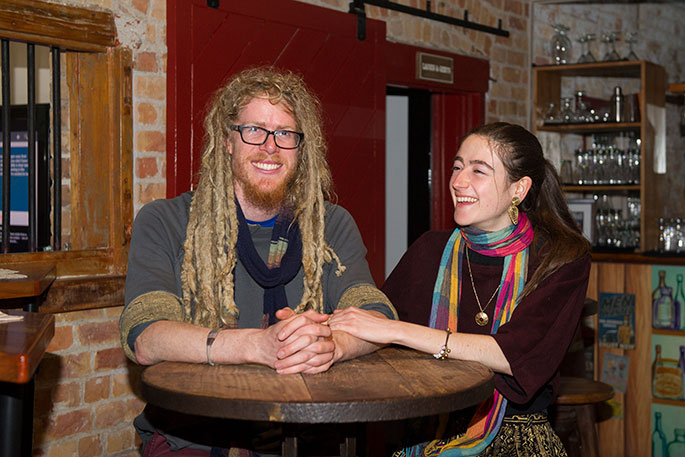It sounds like heresy coming from a couple of zero waste champions – they're preaching that recycling is not the be-all and end-all solution to the world's rubbish woes.
'It's amazing how often recycling is thrown out there as the answer,” says Hannah Blumhardt, one half of the ‘No-Waste Nomads' who are bringing their message to Tauranga – reducing household rubbish, the zero waste approach.
There's minimisation on the crusade too – Hannah and partner Nomad Liam Prince are travelling New Zealand for six months on $10 a day, each. Drive into town, cycle around and bunk down with like-minded souls. It's an easy, cheap, no-waste campaign.
'We aren't anti-recycling,” says Hannah. 'Because we do believe if you are choosing between throwing away to a landfill or a recycling station, then obviously it's better to recycle.” But they are advocating getting past recycling onto higher planes. They want people to rise up the waste hierarchy to something called ‘the six Rs.'
To understand the six Rs it helps to understand the Nomads. They have been ‘zero waste' for two and a half years, creating just 4.6 kilograms of rubbish, enough to fill a supermarket bag, between them. ”Essentially we sent nothing to landfill,” says Liam.
And to put that in context the average individual in Wellington, hometown to the Nomads, puts out 200 kilograms of kerbside rubbish every 12 months. 'So,” says Liam, 'if we had been doing the average we would have produced the literal tonne of rubbish in two and a half years.”
A lot of people are overwhelmed by statistics like that. 'They wonder what can I do, what's the point of doing anything, it won't make a difference. When in fact it does make a difference.”
And that's why the Nomads are bringing their six Rs to Tauranga – a city being swamped by a tsunami of its own domestic waste problems.
'If you can't do one R, move to the next,” says Hannah. The first R stands for refuse. 'Refuse as in saying no to what you don't need.” And if you can't refuse, try R for replace. 'Replace the supermarket bag with a reusable one, replace a plastic toothbrush with a bamboo one.”
Then R for reduce. 'There are some things you really need and you can't refuse or replace them.” For example you can zero waste fancy cheese by taking your own container to a deli. 'But with bulk standard cheese you don't want to refuse or replace but you can reduce.”
R for re-use. Re-use things that can otherwise be waste like glass jars. Fill them up at the bulk bins.
R for recycle. 'Glass is infinitely recyclable,” says Liam. 'But glass is also so useful, why would you send it off for recycling in the first place.”
And the final R is for rot. 'It is telling us that once you have done all the other Rs, what you should be left with is something that could be composted in the home compost,” says Liam.
But what about all the essentials – at the supermarket shampoos, detergents, toothpaste, body products, cleaning products are all in plastic containers.
Liam uses rye flour and lemon juice on his long blond dreadlocks. They make their own toothpaste with coconut oil, baking soda and peppermint essential oil. And they make their own Marmite with roasted and ground black sesame seeds, yeast flakes and tamari soya sauce.
'It's just a case of unlocking your creativity to find solutions to the problems that living with zero waste may bring,” says Liam.
It may be easy for Liam and Hannah who have embraced zero waste with religious zeal, but isn't it all just too bloody hard for the average Joe Disposable to be zero waste? 'A common response,” says Liam. 'Some say we are encouraging people to live as it was in the great depression. But we feel the lifestyle changes we have made have enriched our lives in so many ways we couldn't even imagine.”
And many say even if they had the inclination, they just don't have the time to zero waste. 'The transition to zero waste can be time-consuming but once we were in the swing of it, it seems we have gained time. We would never revert.”
The nomadic zero waste vegans were cycling around Te Puke this week, taking their message to a kiwifruit packing company. 'Between 30 and 100 people will turn up to each of our workshops,” says Liam. And while they are often preaching to the converted, the like-minded bring cynical mates. And epiphanies can happen. The word is spreading.
'We don't have to reach everyone. There can be a critical mass of people applying pressure to people and companies to change their game.”
Living zero waste means doing whacky things like washing hair with molasses or black treacle. 'We are guinea pigs and I can tell you with hand on heart that washing your hair in molasses does not work,” says the nomad with a shock of lustrous brown hair. Could be the rye flour mixed with coffee that does the trick – a formula that seems to have eluded the product chemists at TREsemme and Pantene.
The ‘No-waste Nomads', Liam Prince and Hannah Blumhardt are holding a free 90-minute workshop at the Scout Hall, 13 May Avenue, Mount Maunganui on Saturday, August 19 from 3.30pm until dinnertime. It goes under the banner ‘Reducing our Household Rubbish - the Zero Waste Approach.' It's a prelude to the Little Yoga festival at the same venue in the middle of September.
The rubbish trip will also have a stop off in Whakatane this Sunday. Hannah and Liam will be talking zero waste at Pou Whakaaro, 40 Te Taho Street in Whakatane at 5:30pm. There will be a shared meal and they're down to business at 6pm.

